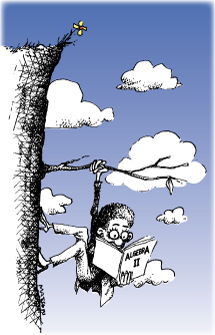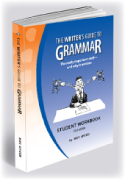|
 newsletter — February 1, 2014 newsletter — February 1, 2014
Advanced mathematics
Homeschooling parents often wrestle with the question: How much math does my highschooler need?
For college-bound students, the usual recommendations are as follows:
- The student must study at minimum algebra 1 and 2, geometry, precalculus/trigonometry.
- For consideration at the more selective colleges, it's recommended that they consider calculus, AP calculus, or statistics.
- If they wish to pursue STEM in college — or want to be considered for the most selective schools or scholarship programs — calculus is a must, and AP courses are strongly recommended.
But while you contemplate this advice, you might want to consider two dissenting points of view.
"The Wrong Answer"
Last summer, Harper's magazine published an article that questioned standard methods of teaching upper-level mathematics — specifically algebra 2 — entitled "The Wrong Answer: The Case Against Algebra II" (requires subscription). The author, Nicholas Baker, skewers one of the most widely used texts in America today:
The textbook's cover is black, with a nice illustration of a looming robotic gecko. The gecko robot has green compound eyes and is held together with shiny chrome screws. It has a gold jaw and splayed gold toenails. Perhaps you like the idea of robotic geckos, and you might expect, reasonably, that there would be something about the mathematics either of geckos or of robots somewhere in this book. There isn't. There is, however, at the beginning of Chapter 8 ("Rational Functions"), an interesting high-speed photograph of a basilisk lizard, also known as a Jesus Christ lizard, that is dashing on tiptoe across the surface of a body of water. A facing caption says:
Rational functions help explain how surface tension allows some animals to tread across a pond's surface. How can you graph rational functions and solve rational equations? You will learn how in this chapter.
But again you discover, to your disappointment, that the lizard image is just a bit of bait-and-switch. There's nothing about surface tension or walking on water in Chapter 8 — and indeed, the caption would puzzle an expert on reptilian locomotion, since basilisk lizards don't actually rely on surface tension to run on water.
This text has been carefully designed to conform with the new Common Core State Standards for math, which are slated to be imposed on all students in all states. But in this same text, Baker cites numerous passages containing mystifying concepts, indecipherable verbiage, and seemingly pointless exercises. This text, he concludes, is "a highly efficient engine for the creation of math rage..."
Baker questions the necessity of force-feeding algebra to all students regardless of their individual aptitudes, inclinations, or career plans. He goes on to quote a number theorist who is a longtime critic of math requirements in schools:
I called Dudley and asked him pointblank whether we should be requiring Algebra II of all high schoolers. "Good heavens, no," he said. "Forcing people to take mathematics is just terrible..."
He also quotes Derek Stolp, a math teacher for 30 years and the author of Mathematics Miseducation:
"Any implication that logical thinking is taught only through mathematics is plainly false," Stolp wrote, "and the argument that it is taught most effectively through mathematics is, at best, questionable." Stolp told me that although he loves teaching algebra, he doesn't believe children should be compelled to master abstract algebraic techniques that they find meaningless.
In the end, Baker concludes that the Common Core enthusiasts want to impose math on all students out of a good impulse: statistics show that students who do well in math are more likely to get into college. The problem, he says, is our circular logic: we made math a requirement for getting into college — so of course students who make it over this hurdle are more likely to end up there.
Another view
In an blog posting last fall, C.J. Westerberg argues that more engaging, interesting applications of mathematics are available to teenage students. These methods will not only leave the students in a better position to understand abstract mathematics; they will enthrall and motivate the students.
Westerberg echoes the dissenting academic voices who say that advanced mathematics should be a gateway, not a gatekeeper, to a successful college education. He cites learning styles as an important consideration when teaching mathematics to teenage students. He suggests "substituting other logic-inducing courses such as coding which may appeal to more hands-on learners who would like to produce something at the end of a day instead of just a grade score."
(Westerberg recommends Conrad Wolfram's TED Talk on math instruction.)
Our two cents
Many educators will admit that textbooks often fall pitifully short of engaging the curious mind of a teenager. Homeschooling parents must be vigilant in math, as they are in other subjects, to provide rich and meaningful content — even in mathematics.
The homeschooling students we know who find meaning in learning abstract mathematical concepts do more than just use textbooks:
- They join local high school robotics teams, like FIRST. The challenge is to find a team that accepts homeschoolers for a First Robotics (FRC) team. There is also the First Tech Challenge (FTC), a slightly less technical and less costly segment of FIRST; homeschoolers can more readily start a team.
- They take part in Science Olympiad. SO teams can be easily started and administered by a homeschooling parent.
- They conduct hands-on projects at home and exhibit their creations at local MAKER Faires or Mini-MAKER Faires.
As an illustration of this last point, consider the young man in our homeschool group who built a jet engine on his own because he was interested in learning more about engines and motors. You can read all about him — and even view photos of his jet engine — here.
The larger point here: We homeschooling parents always have to be looking at our student — and then tailoring our approach to his or her needs and interests. Granted, that approach may incorporate a standard text. But we must also ask ourselves: For my student, what's going to bring this subject to life?
|
|
|
View all our online courses here.
Eight weeks, in depth, live & online
Twice weekly sessions for two semesters
Twice weekly sessions for two semesters
- March 7, 2020: Beyond the Tour: Getting the most from your college visits
- July 29, 2019: Advocating for oneself, Part 2: College admissions essays & interviews
- May 29, 2019: What our students aren't taught about grammar
- May 16, 2017: Advocating for oneself (Part 1 of 2)
- July 20, 2016: The development of adolescent minds
- December 24, 2015: The appeal of videogames—and the hazards they bring
- August 16, 2015: Three skills your student needs to develop before college (Part 1 of 3)
- July 3, 2015: How literature is now taught in college—and why enrollment in literature courses is in steep decline
- June 1, 2015: Teaching Shakespeare to your kids: What I've learned
- Dec 28, 2014: Extracurricular activities, Part 2
- July 27, 2014: Levels of annotation —
Annotating the text, Part 2
- July 15, 2014: Extracurricular activities, Part 1
- July 2, 2014: Teens need to be together… An innovative solution
- June 9, 2014: The college admissions racket — Getting things into perspective
- June 2, 2014: Building good study habits
— Annotating the text, Part 1
- April 8, 2014: Building good study habits
— Close reading
- March 18, 2014: Why all our students must study Shakespeare
- Feb 25, 2014: Standardized tests, Part 2
- Feb 18, 2014: Standardized tests, Part 1
- Feb 1, 2014: Advanced mathematics
|
|
Shakespeare Intensives
Close reading of Shakespeare
Ten online sessions of 90 minutes
Ten online sessions of 90 minutes
Seven online sessions of 90 minutes
An introduction to Shakespeare's comedy
Eight online sessions of 90 minutes
ONLINE: English Language Arts
— Now open for registration —
Weekly online class
in the essentials of English
 This two-semester course is taught by the author of The Writer's Guide to Grammar. It puts in place skills and knowledge foundational to the study of English and the mastery of clear writing. The weekly class is live and online, and students master all the most important principles of the English language — grammar, usage, punctuation, and more. This two-semester course is taught by the author of The Writer's Guide to Grammar. It puts in place skills and knowledge foundational to the study of English and the mastery of clear writing. The weekly class is live and online, and students master all the most important principles of the English language — grammar, usage, punctuation, and more.
Online Writing
Two semesters of online classes
Two classes per week
Online Literature
Two semesters of online instruction
Training for parents
Now an online series!
This program addresses the principal concerns parents have about homeschooling through high school — curriculum and credits, standardized tests, transcripts and record-keeping, the application process, pursuing scholarships, and more.
Terrific. Full of information. The materials were so thorough. I now have a plan of action. Also, this workshop is inclusive: No matter what type of homeschooler you are, you will understand better how to prepare your student for college and present him or her in the best light.
Mother of two
|
|
![]()